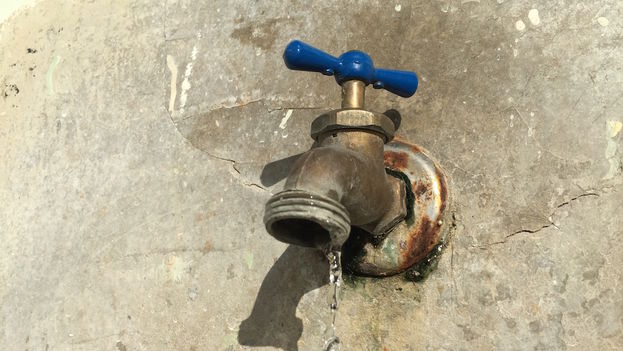
![]() 14ymedio, Rosa Lopez, Havana, 25 May 2015 – A sound that is inseparable from the streets of Habana Centro (Central Havana) is the screech of the trucks filled with water, with their metal wheels on the asphalt. This symphony of necessity has become more intense in recent months because of the frequent cuts in supply that the city has undergone due to repairs, breakages and a drought affecting the entire country. More than 58,760 people receive water through tanker trucks, as affirmed, this Monday, in the Trabajadores (Workers) newspaper.
14ymedio, Rosa Lopez, Havana, 25 May 2015 – A sound that is inseparable from the streets of Habana Centro (Central Havana) is the screech of the trucks filled with water, with their metal wheels on the asphalt. This symphony of necessity has become more intense in recent months because of the frequent cuts in supply that the city has undergone due to repairs, breakages and a drought affecting the entire country. More than 58,760 people receive water through tanker trucks, as affirmed, this Monday, in the Trabajadores (Workers) newspaper.
In Havana more than half of the water being pumped is lost in leaks, 20% of which are located in the so-called household networks, inside homes and buildings. For the engineer Antonio Castillo, Deputy Director of Operations for the Havana Water company, the situation is unsustainable in the medium and long term. “Supply basins are like bank accounts. If you deposit, but take out more than you deposit, you have less and less, and if you stop saving, one day you’ll have no money. That happens with the water,” he declared to the official press.
In late February the situation began to worsen because of the disastrous combination of leaks and electrical problems that caused large losses at La Cuenca Sur reservoir. About 45,000 residents of Habana Vieja, Plaza de la Revolución, Diez de Octubre, Centro Habana and Cerro municipalities in Havana were severely affected.
In order to reduce leaks, sector specialists propose to continue with network rehabilitation plans and impose a new fee on the charge for service for the residential sector. Meanwhile, capital residents are demanding shorter water delivery cycles and a higher quality of the precious liquid. “The water is very hard and this damages the pipes and bathroom iron fittings, that’s why there are so many leaks,” says Ruben, a self-employed plumber in La Lisa municipality.
Capital residents are demanding shorter water delivery cycles and a higher quality of the precious liquid
Others demand, as soon as possible, the enactment of a water law to regulate the consumption of this important natural resource. “Although in December the Council of Ministers approved a stricter policy, they are still indiscriminately wasting something that should be treated as a real treasure,” expressed Yaquelin de la Osa, engineer and promoter of a more focused policy on caring for the environment and natural resources.
Apart from the specialized opinions or those with in the environmental field, the main demands come from a population sector that needs to bring the water into their homes with wheelbarrows, buckets and bottles. “I don’t remember when was the last time that I could take a shower, because for several months I have had to bathe with a pitcher,” says Xiomara, resident of a tenement room at Marqués González street in Centro Habana.
Everyone agrees that repairs to the hydraulic networks are necessary, but the slowness and lack of efficiency with which they are tackled causes discomfort among many Havanans.” This seems like a city after a bombing,” said an owner of rooms for rent for tourists located in Amargura street in in Habana Vieja, who must deal with the holes and trenches in the street every day to find customers. The municipality is being subjected to a replacement of the water networks which will be completed in 2017 and which has a budget of more than 64 million.
I don’t remember when was the last time that I could take a shower, because for several months I have had to bathe with a pitcher
The water that should fall from heaven hasn’t performed as expected in this rainy period. Downpours that flooded parts of the city in late April and early May failed to fill the cachement areas supplying the city. Precipitation was not abundant in the southern provinces of Artemisa and Mayabeque, which are the main sources of supply, nor in the Almendares-Vento basin, which supplies 47% of the water which is destined to Havanans.
As the situation worsens, Havanans wake up trying to detect clouds on the horizon and fall asleep with the sound of the trucks on the pavement.
Translated by Alberto
